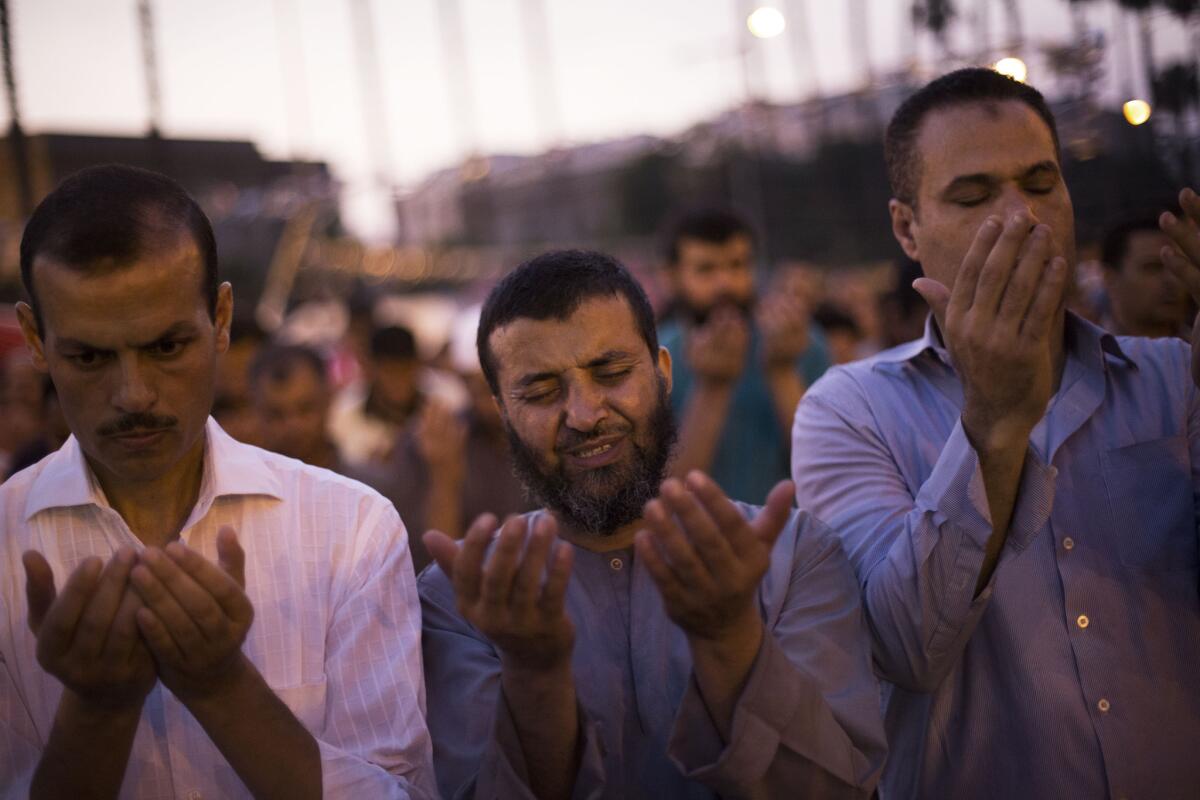Egypt’s government, pro-Morsi protesters may be near compromise

- Share via
CAIRO — After weeks of deadly clashes, Egypt’s military-backed government and supporters of deposed president Mohamed Morsi may be edging toward a compromise that could ease the latest unrest threatening the nation’s erratic path toward democracy.
Egypt remains volatile and mistrust between the two sides is deep. But the government and Morsi loyalists, notably his Muslim Brotherhood movement, met over the weekend with international envoys in efforts to calm the divisions in the Arab world’s most populous and strategically important country.
Thousands of the former president’s supporters have vowed not end their sit-in at the Rabaa al Adawiya mosque until Morsi, who was overthrown in a coup last month, is reinstated. In recent days, however, Islamists have acknowledged for the first time the discontent that led millions of Egyptians to rally against Morsi, triggering Gen. Abdel Fattah Sisi, commander of the armed forces, to act.
“Political solutions must be found,” Tarek El Malt, a leader in the pro-Morsi wing, was quoted as saying by the state-run newspaper Al-Ahram.
That opens the possibility of wider negotiations with the government. But the Brotherhood, at least publicly, is demanding concessions the army may refuse, including releasing Morsi and other Brotherhood leaders from detention, freeing the seizure of the group’s financial assets and lifting a ban on several Islamist television stations.
The scenario is dangerous for the Brotherhood. The once-outlawed organization emerged as the country’s most potent political voice in 2012. But its disastrous year in power created a backlash. It now risks angering its base if it appears to compromise too much with the government. And it faces further alienation—and squandering a chance to shape a new constitution—by not rejoining the political process.
The implications of Morsi’s overthrow have raised doubts over whether political Islam can flourish in Egypt, Tunisia and other nations rising from the 2011 Arab revolutions. The Brotherhood is the most influential Islamist movement in the world; its failure to rule effectively illustrates that many Egyptians want a clear line drawn between religion and politics.
The largely secular interim government is struggling with its own dilemmas. It is split between hardliners and moderates, including Vice President Mohamed ElBaradei, a Nobel Peace Prize laureate, whose reputation could be damaged if a crackdown on Islamists results in fresh bloodshed.
“Those who want to crush the Brotherhood accuse me of being soft. I don’t believe my concern over the loss of lives makes me a soft man,” ElBaradei said in a television interview Saturday. “It’s easy to get angry and say we’ll crush the Islamists, but it will result in massive deaths.”
The comments suggest that officials have calculated the public relations cost of a rising body count, probably involving women and children, on a country desperate for international investment. The military and Interior Ministry, which last week threatened to storm the sit-in, have sounded more conciliatory as they move to impose order without further inflaming political passions.
But the army and Sisi also have frequently referred to Morsi’s backers as terrorists. In a proactive action by the government Sunday, a Cairo court announced that the Brotherhood’s supreme guide Mohamed Badie and its chief financier and strategist Khairat Shater would stand trial on murder charges related to clashes outside the organization’s headquarters that began in June.
Sisi met with several Islamist leaders over the weekend in effort to defuse the protests. But Egypt’s National Defense Council warned that the military would not let the sit-in drag on and that negotiations for a solution must be “defined and limited and ... not infringe on the law and the rights of citizens.”
More than 200 people, mostly Morsi followers, have died in recent clashes with security forces. The police have said they will blockade the streets leading to Rabaa al Adawiya to stop supplies from reaching the protesters, who live in tents and spend their days praying and listening to sermons and speeches by clerics and ultraconservative politicians.
International envoys, including Deputy Secretary of State William Burns, have held talks with both sides on Saturday and Sunday. Defense Secretary Chuck Hagel urged Sisi to show restraint. Not all international dignitaries were allowed to enter the country—airport authorities refused to give Tawakul Karman, a Nobel Peace Prize laureate from Yemen who supports Morsi followers, a visa when she landed Sunday.
The crucial question to ending the political showdown is how long the military’s patience will last. Sisi’s popularity is high and many Egyptians support a move against the Morsi camp, which claims that the coup has turned into a war against Islam.
“I repeatedly told Sisi that dispersing the sit-in is not right,” said ElBaradei. “But still, if we reach a point where there is no alternative to using violence, it has to be exercised with minimal loss of life.”
ALSO:
Zimbabwe President Robert Mugabe reelected; opponents cry foul
Stoli boycott targets Russian anti-gay law -- but hits Latvian vodka
Can Brazil fix mistakes from Pope Francis visit in time for World Cup?
jeffrey.fleishman@latimes.com
Special correspondent Ingy Hassieb contributed to this report.
More to Read
Sign up for Essential California
The most important California stories and recommendations in your inbox every morning.
You may occasionally receive promotional content from the Los Angeles Times.











